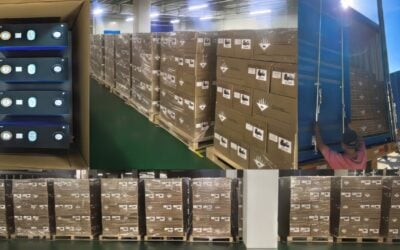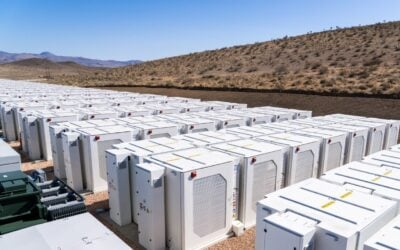NEC Corporation has commissioned a 2MWh lithium-ion battery energy storage system designed to ease the integration of renewable energy into the grid for Italian distribution system operator (DSO) Enel Distribuzione.
The DSO is a subsidiary of multi-national Enel Group and is using the NEC system to trial the capabilities of energy storage systems in a range of applications. These include peak shaving, power balancing, power quality, voltage regulation and frequency regulation.
NEC hopes the system, which is located at Chiaravelle Primary Substation in the Calabria region, will assist in the balance of supply and demand of electricity as the area has a high implementation rate of renewable energy sources. Energy storage systems are increasingly being considered as a possible answer to grid reliability issues, stemming from an excess of renewable power capacity relating to consumption. These excesses can cause reverse power flows from the low voltage grid to the medium voltage grid, which could potentially result in disruption to electricity supplies or damage to grids, in the worst case scenario.
However, a range of commentators including Didier Houssin of the International Energy Agency (IEA) have recently stated that while storage could assist with grid integration of renewables, it is not ‘silver bullet’ technology that could simply resolve all such problems at the current stage of its development. The IEA recently launched a technology roadmap for energy storage development.
Try Premium for just $1
- Full premium access for the first month at only $1
- Converts to an annual rate after 30 days unless cancelled
- Cancel anytime during the trial period
Premium Benefits
- Expert industry analysis and interviews
- Digital access to PV Tech Power journal
- Exclusive event discounts
Or get the full Premium subscription right away
Or continue reading this article for free
Enel Distribuzione is also using the NEC system to test its suitability for use in distribution and ancillary markets, by controlling the flow of electricity from Enel’s substations to the national grid. Enel Distribuzione will forecast electricity demand and send it to the electricity transmission system operator (TSO). During the trial the TSO’s role will be simulated by computer software.
The NEC lithium-ion system will regulate the gaps between this demand profile and actual energy flow caused by variable input of renewable energy sources. The lithium-ion battery system charges or discharges accordingly depending on the profile. Enel plans to eventually integrate the NEC system into its smart grid infrastructure.
NEC was scheduled to report its findings and experiences from key ESS trials at the Energy Storage World Forum in London later today.
Earlier in the month, Terna, Italy’s TSO awarded a tender to provide a 1MW/1MWh battery system in Sardinia to a partnership which includes storage company Younicos, Samsung SDI and Italian renewable energy producer Green Utility. Similar in scope to the collaboration between NEC and Enel, the system aims to stabilise Sardinia’s island grid.
Meanwhile, Prof. Dr. Eicke R. Weber, president of the Germany Energy Storage Association (BVES), who is also the director of Fraunhofer Institute for Solar Energy Systems, has spoken of the importance of speedy development of energy storage systems.
Weber gave a speech on the final day of the Energy Storage 2014 conference, taking place in Düsseldorf, Germany in which he said: “The energy storage market is in the same situation today as photovoltaics ten years ago; only development in the area of storage must proceed significantly faster.”
The NEC 2MWh lithium-ion system at Chiaravelle substation, Calabria, Italy. Image: NEC Corporation.





